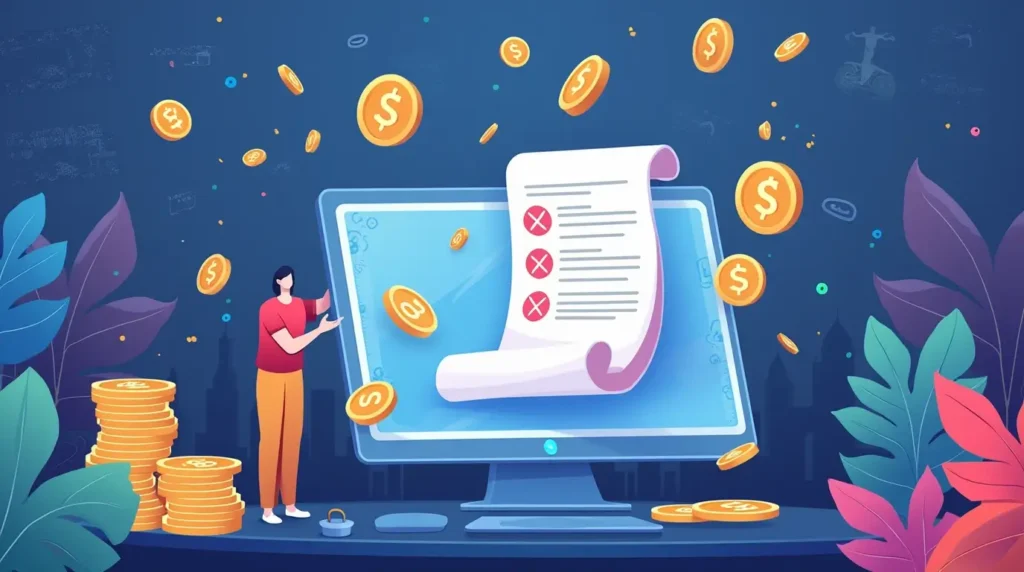Table of Contents
In today’s rapidly advancing technological world, opportunities to earn money have taken on new, innovative forms. One such opportunity is smart contracts—automated digital agreements that execute and enforce the terms of a contract on the blockchain. If you’ve heard about them but aren’t sure how to make money with smart contracts, you’re in the right place. This article will guide you through various ways to earn income using smart contracts, whether you’re a beginner or an experienced crypto enthusiast. One of the most exciting opportunities is generating smart contracts cash flow—a sustainable income stream that can grow over time.
As blockchain technology continues to evolve, more and more people are discovering how to leverage smart contracts to create reliable income sources. From passive income streams in DeFi to creating your own decentralized applications, the possibilities are endless. By the end of this article, you’ll have a clear understanding of how to start earning money with smart contracts, whether you’re new to crypto or already experienced in the space.
Top Ways to How To Make Money With Smart Contracts
1. Earning Through Decentralized Finance (DeFi) Platforms
Decentralized finance (DeFi) platforms are one of the most popular ways to make money with smart contracts, offering you the chance to create your own smart contracts cash flow by lending, borrowing, staking, and earning interest. DeFi removes intermediaries like banks, making the entire process faster and cheaper, and allowing users to earn significant returns on their investments.
How to Earn from DeFi:
- Lending and Borrowing: Platforms like Aave, Compound, and MakerDAO allow you to lend your crypto to others and earn interest. In return, borrowers pay fees, creating a consistent stream of smart contracts cash flow for lenders.
- Yield Farming and Staking: By staking your assets on DeFi platforms, you earn rewards, and often these rewards are paid directly into your wallet as smart contracts cash flow. Yield farming involves locking up liquidity in a smart contract, earning rewards in the form of governance tokens or interest.
How to Get Started:
- Choose a DeFi Platform: Start by selecting a platform that allows you to earn passive income from smart contracts. Popular options include Aave, Compound, and Uniswap.
- Set Up Your Crypto Wallet: Use a wallet like MetaMask or Trust Wallet to interact with these platforms.
- Deposit Your Crypto: Once your wallet is connected, deposit your cryptocurrency into the platform and start earning. Typically, platforms will offer a variety of investment options like stablecoin lending or liquidity provision.
Risks and Rewards of DeFi:
DeFi offers exciting rewards, but it’s essential to understand the risks involved, such as smart contract bugs, impermanent loss, and volatility. Always research and use secure platforms to avoid losing your smart contracts cash flow. DeFi is still a relatively new sector, and while it’s booming, it’s not without risks. Ensure the platform has been audited and provides transparency regarding its smart contract code.
2. Building and Deploying Your Own Smart Contract
If you’re familiar with coding or are willing to learn, you can build and deploy your own smart contracts. This allows you to create a smart contracts cash flow by offering services, decentralized applications (dApps), or custom contract solutions to businesses and individuals. You can monetize your expertise and the solutions you provide while building your reputation in the blockchain ecosystem.
How to Build and Monetize Smart Contracts:
- Custom Contracts for Businesses: Many businesses are interested in using blockchain technology, and by offering to create smart contracts, you can earn money while creating a reliable smart contract cash flow. For example, businesses might need smart contracts for supply chain management, property transactions, or automatic payments.
- Launch Your Own dApp: By building a decentralized application (dApp) that relies on smart contracts, you can earn through transaction fees, subscriptions, or other revenue models, turning your smart contracts into a continuous cash flow. Popular dApps in the market today are decentralized exchanges like Uniswap, NFT platforms like OpenSea, and lending protocols like Compound.
Steps to Get Started:
- Learn Solidity: Solidity is the most commonly used language for smart contract development. You can find free resources on platforms like CryptoZombies or learn through coding bootcamps.
- Choose a Blockchain Platform: Ethereum, Binance Smart Chain, and Solana are all great options for deploying your smart contracts. Ethereum is widely used, but Solana offers faster transaction speeds and lower fees.
- Develop and Deploy Your Smart Contract: Once you’re comfortable with the development process, you can deploy your contract using development frameworks like Truffle, Hardhat, or Remix, and interact with them via Web3 libraries like Viem.
Monetizing Your Smart Contracts:
As you deploy your contracts, you can monetize them by charging transaction fees, offering consulting services, or even creating a marketplace where users can pay to interact with your dApp.
3. NFT Projects and Tokenization
Smart contracts have played a crucial role in the NFT boom. NFTs are powered by smart contracts that automatically transfer ownership, making them an ideal opportunity to generate smart contracts cash flow. Whether you’re creating or trading NFTs, the blockchain ensures secure transactions and payment distribution.
how to make money with smart contracts (Nfts)
- Create Your Own NFT Collection: By creating and selling NFTs on platforms like OpenSea, you can earn money every time an NFT is sold, and you can also set up royalties, earning money every time your NFTs are resold.
- Launch an NFT Marketplace: You can also launch your own marketplace for buying and selling NFTs, charging a small commission on each sale to generate a smart contract cash flow. OpenSea and Rarible are successful examples of NFT marketplaces powered by smart contracts.
How to Get Started:
- Design Your NFTs: Create digital art or assets that hold value in the NFT market. You can create art, music, digital collectibles, or even virtual real estate.
- Mint Your NFTs: Use platforms like OpenSea or Mintable to mint your NFTs and tokenize your creations. Smart contracts are used to establish ownership and transfer these tokens between users.
- Market Your NFTs: Promote your NFTs on social media and NFT communities to attract buyers. NFT marketing is key to generating visibility and sales, so consider using platforms like Twitter, Discord, and Instagram to engage potential buyers.
Monetization Methods:
- Royalties on Resale: One of the best features of NFTs is the ability to earn royalties every time your NFTs are resold. This can create a long-term smart contracts cash flow and a continuous passive income stream as the value of your creations increases.
4. Creating a Blockchain-Based Service or App
With the rise of blockchain, creating a decentralized application (dApp) or blockchain service can provide you with an ongoing smart contracts cash flow. Whether it’s a game, marketplace, or social platform, users will pay transaction fees to interact with your dApp. This can be an especially lucrative model if your platform becomes popular.
Monetizing dApps:
- Transaction Fees: Every time a user interacts with your app, you can charge a small fee, creating a continuous income stream. For example, decentralized exchanges like Uniswap generate significant revenue through transaction fees.
- Subscription Models: Offer premium features or services for a monthly fee. This is particularly popular for dApps that provide valuable services like analytics, secure storage, or unique functionalities.
How to Get Started:
- Identify a Need: Find a niche where you can solve a problem using blockchain and smart contracts. For example, a decentralized music platform or a supply chain tracking tool could serve businesses in need of more efficient systems.
- Develop the dApp: Build the dApp on a blockchain like Ethereum or Solana, incorporating smart contracts for automation. Use decentralized or serverless solutions for hosting.
- Launch and Promote: Once your dApp is ready, launch it and start marketing to attract users.
Practical Guide to Getting Started with Smart Contracts


Setting Up Your Wallet and Selecting a Platform
Before diving into smart contracts, set up a wallet to manage your crypto funds and interact with platforms. Choose between wallets like MetaMask or Trust Wallet, and then select a blockchain that fits your needs, whether it’s Ethereum for its wide adoption or Solana for its low fees.
Choosing a Platform
When selecting a blockchain platform to deploy your smart contracts, consider transaction costs, speed, and the type of community you want to be a part of. Ethereum remains the leader, but platforms like Binance Smart Chain and Solana offer faster, cheaper alternatives.
Risks and Challenges in Making Money with Smart Contracts
While earning from smart contracts can be profitable, it’s not without risks. The code in a smart contract is immutable, meaning once deployed, it cannot be altered. If there are bugs or security flaws, they can result in lost funds or failed transactions. Market volatility can also affect the value of your income.
Always audit smart contracts before using them, and consider utilizing insurance protocols to safeguard your investments. As the blockchain space is still relatively new, you must proceed with caution, especially when dealing with high-value assets.
Conclusion: The Future is Bright with Smart Contracts
Smart contracts have revolutionized how we think about income generation, offering multiple ways to create a smart contracts cash flow. From DeFi to NFT creation, and dApp development, there are many opportunities to leverage blockchain technology for financial gain. The key is to research, understand the risks, and get started with platforms that align with your goals. Don’t wait—begin building your smart contracts cash flow today and tap into the future of decentralized finance.





